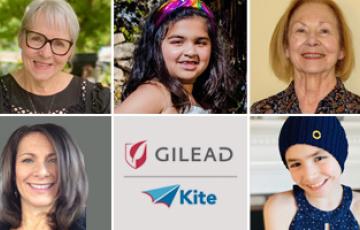Search Results
Ibritumomab tiuxetan
Ibritumomab tiuxetan is FDA approved to treat people who have relapsed or refractory, low-grade or follicular non-Hodgkin lymphoma (NHL), including patients with follicular NHL that did not respond to therapy with rituximab. It is also FDA approved to treat patients with previously untreated follicular NHL who achieve a partial or complete response to first-line chemotherapy. This drug is a monoclonal antibody with an attached radioisotope to deliver radiation therapy to the lymphoma cells.

Beyond Blankets: Subaru Loves to Care brings comfort and warmth
Blood cancer treatment can be a scary and confusing time. And blood cancer patients want to feel like they’re not alone.
That’s why The Leukemia & Lymphoma Society (LLS) and Subaru are partnering to bring warmth and comfort to blood cancer patients through warm blankets, patient care kits, and handwritten notes of encouragement.
Targeting AML
Not for lack of trying, we’ve seen very little progress over the past 40 years in treating acute myeloid leukemia (AML), an aggressive and deadly blood cancer. But we’re finally starting to see the needle move and The Leukemia & Lymphoma Society (LLS) is playing a leading role in going on the offensive against the disease.
Leveraging cancer registries, clinical trials, and community partnerships to address disparities in pediatric, adolescent, and young adult lymphoma
I aim to identify drivers of pediatric and adolescent/young adult lymphoma disparities so that targeted health equity interventions can be developed. Integration of large datasets, systematic collection of social determinants data in clinical trials, and collaboration with patient advocates will: a) create new population-based resources to study lymphoma outcomes; b) establish a novel framework for equity research in lymphoma clinical trials; and c) identify real-world targets for intervention.Pluripotent Stem Cell-derived CAR-T and CAR-NK Cells for Immunotherapy of Leukemia and Lymphoma
Cytotoxic cells of the immune system, including T and NK cells, can be targeted to seek out and destroy leukemia, lymphoma and myeloma cells by engineering them to express chimeric antigen receptors (CARs) which empower the cell to home to and kill the cancer cells. Typically, such CAR-T and CAR-NK cells are generated from a patient's own blood, but sometimes heavy pre-treatment with chemotherapy leaves inadequate supplies of T and NK cells.Carmustine
Carmustine is FDA approved to treat people who have myeloma (in combination with prednisone); relapsed or refractory Hodgkin lymphoma (as secondary therapy in combination with other approved drugs in patients who relapse while being treated with primary therapy or who fail to respond to primary therapy); relapsed or refractory non-Hodgkin lymphoma (as secondary therapy in combination with other approved drugs).



